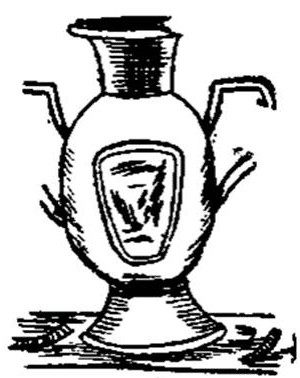This article has been transcribed from a copy of the Cardiff Times in the online collection of scanned Welsh newspapers 1804-1919 in the National Library of Wales, with grateful recognition of the free access accorded to all readers.
The illustration of a nun draws on a common Protestant belief of the time that many nuns were women disappointed in love. The significance of the image in illustration 3 and its caption remain obscure. —— David Skilton

he worship of idols is a form of adoration so old that one would prefer not to have to trace its origin. In the olden times the idols took some tangible form, and had a direct connection with the religion or belief of the people who fell down and worshipped them. Even to-day there are idols, the tangibility of which cannot be doubted, that are worshipped with all the fervour and pig-head[ed]ness which was so characteristic a feature of the heathens of old, who fancied a brazen god or a graven image were either of them capable of ruling the destinies of nations, and of decreeing the fate of unoffending mortals.

Had his Pension Idol Shattered
It is perhaps more in the early days of life that we cherish our pet idols, and the springtime of youth is far more likely to be redolent of fancies and idol worship than the summer, autumn, or winter of existence.
By the time men and women arrive at the autumn of life they have generally discovered that few idols are worth the adulation they have Iavished upon them, and that not a few of them get shattered as soon as they have become part and parcel of a person's life.
If we could but learn this lesson of experience early, oh how much sorrow, regret, and bitterness would be spared us.

Had her Love Idol Shattered
It is not the mere fact that the idol we have worshipped is shattered that makes us feel so bitter at times, it is the feeling of mistrust and regret at the failure of our hopes and dreams. We are, after having our illusions disabused, apt to look upon the world and its contents with jaundiced eyes, and if we do not watch ourselves there is a great danger of our becoming permanently cynical. Take the case of a girl who is deceived by the man she loves – or thinks she loves. To her he is perfection for a time, in fact she worships him as the idol of her life.
To be near him is happiness, to be parted from him is misery.
He is all in all to her, and she is perfectly certain that if anything were to happen to him she would die straight away. Of his truth and honour she has no doubt, and looks upon those who hint that her lover is not the god she makes of him as slanderers and mischief-making busybodies. Yet in due course she is undeceived as to the true character of her lover, and wakes up from her dream of faith and happiness to find the 'busybodies' were correct, and that her long and keenly-cherished idol has been rudely shattered. For long days after she has no faith in man, and it is only after a lengthy process of self-abnegation that she comes round to the belief that there are just as good fish in the sea as ever came out of it.
Some women never recover from the shock consequent upon a shattered idol, and many an old maid could tell of silent tears and an aching heart which were the out-come of a broken faith in a heartless and unscrupulous man.

Shattered a Good Man's Idol
There are [o]ther idols which men and women cherish beside those of love. The idol of ambition is a common stumbling-block with those whose lot in life is laid more amid the thorns than the roses, and it is as fatal in its Will-o’-the-wisp-like allurements as any other forms of idol adoration. Men have ambitions for themselves and for their children, and it is a sad sight to see the man who, toiling hard all his life to reach the goal of his ambition, falls down incapacitated when within sight of his cherished idol.

Shattered
There is no misery so acute as the misery of the man who, conscientiously thinking his idol a reality, finds, too late to recall his wasted hours, that it is but a phantom of his brain. The painter and the poet usually set up an idol of their own, and for a time labour lovingly to reach it. It may at times be reached and enjoyed to the full, but it is, alas, too often missed, and the painter turns his hand to 'potboilers,' while the poet, discarding the pure and soul-lit poetry, turns his attention to doggerel and filthy lucre. Soldiers who have fought for their country daily tell tales of shattered idols, of luring baits held out to them on joining the ranks, which, after hard lives and injured limbs, have taken the forms of inadequate and miserable pensions. This form of shattered idol is a disgrace to the country, for when men fight and lose limbs for the honour and glory of their native land, they are surely entitled to more tangible recompense than can be obtained from the knowledge that their idols have been shattered.
Links to Related Material
- Samuel on Some of the Mistakes of His Life>
- A Literary Aspirant
- Samuel’s Advice to Literary Aspirants
- Is Marriage a Failure?
Last modified 28 April 2022